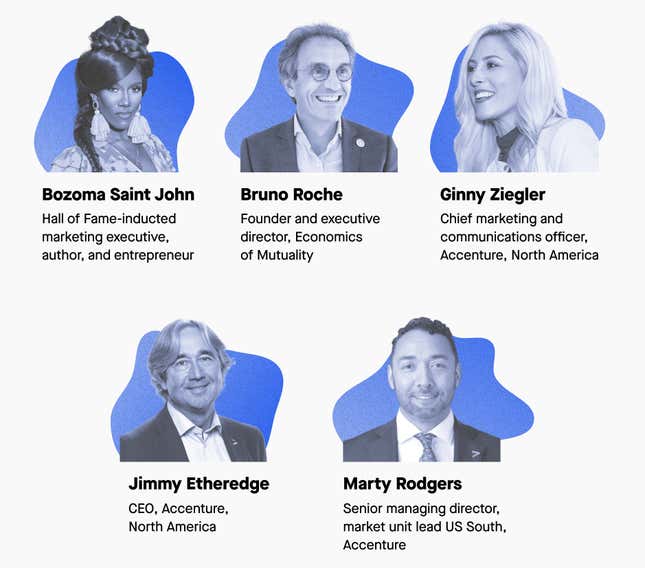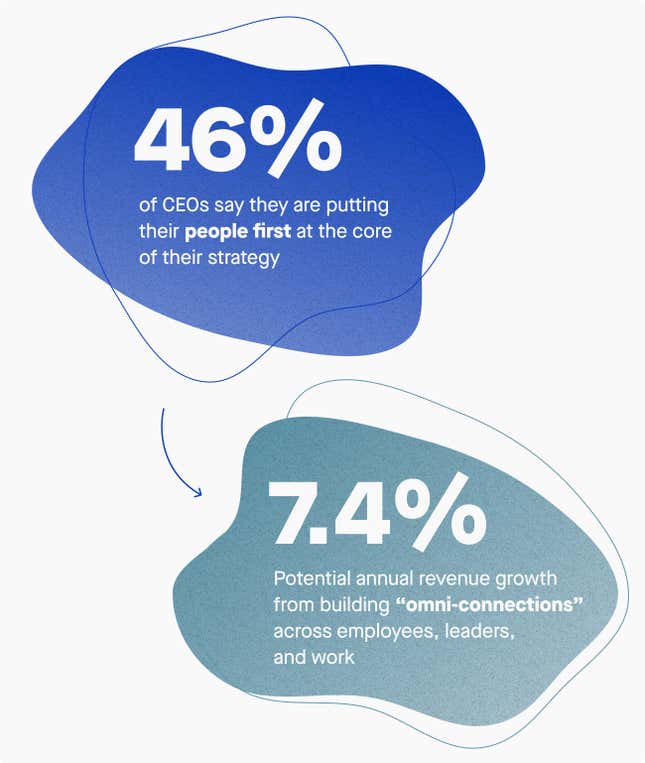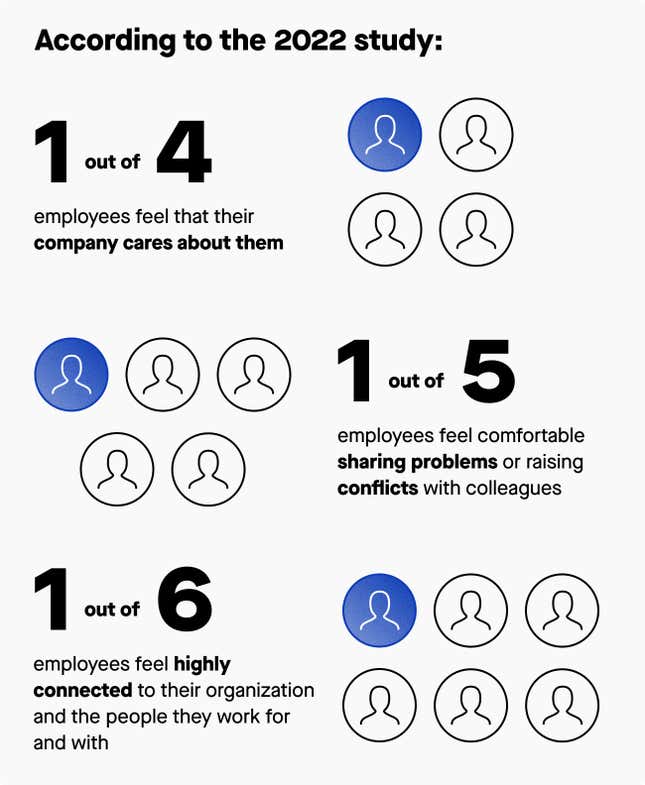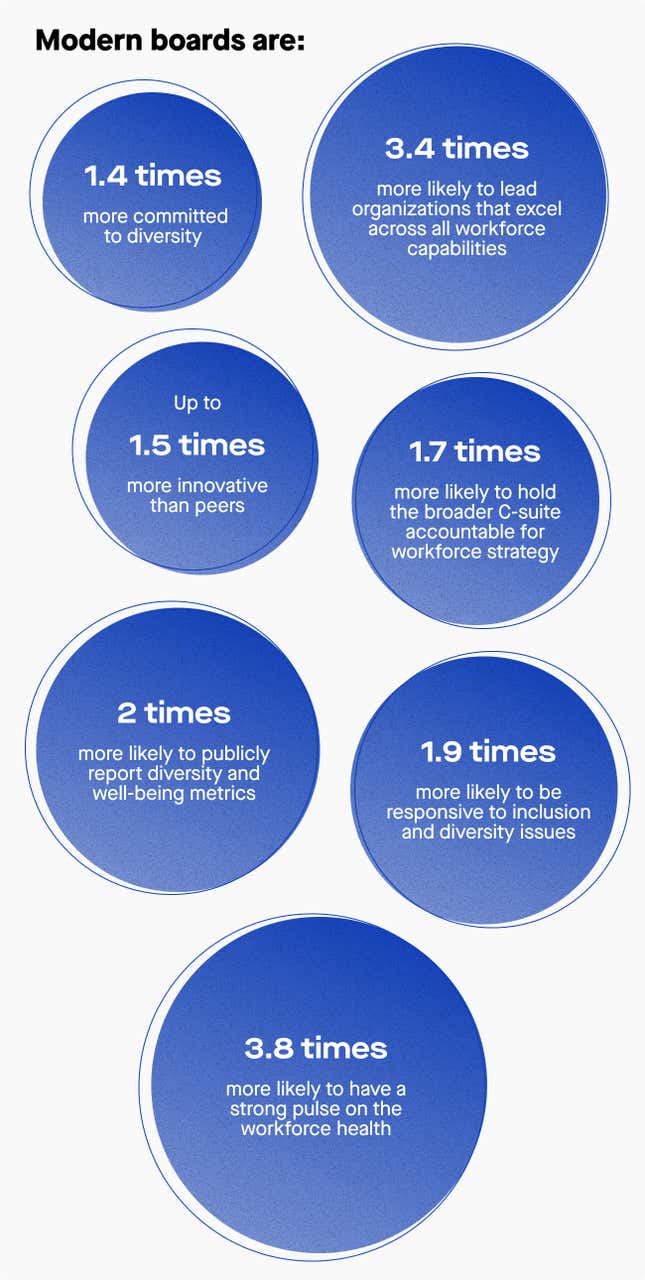
As company culture increasingly becomes an asset in competitive differentiation, there’s a growing imperative to create space for employees to show up to work as their authentic selves.
The good news is that, according to Accenture’s “Organizational Culture: From Always Connected to Omni-Connected” study, culture was a topic in 53% of the earnings calls analyzed from January 2020 to April 2022, and one in two CEOs are committed to investing in talent to drive their business transformations.
However, that same research found that only 24% of US employees feel like they truly belong and bring their authentic selves to the workplace. Worse yet, respondents believed that their leaders generally overestimate the connectedness of their people by 2x, and only one in four report that leaders are responsive to their needs, communicate regularly, and treat team members equally.
In this dissatisfaction lies an opportunity for company leaders to create more satisfying and nurturing work environments. It’s these cultures that have the power to increase employee satisfaction, retention, and productivity, all factors that are critical to growing a sustainable business.
“CEOs’ roles have evolved dramatically, and it’s a very good thing,” says Jimmy Etheredge, CEO of Accenture North America. “We’re not just driving the bottom line. We’re leading our businesses to drive positive changes in people’s lives and in society.”
The good news is that this shift is an opportunity for leaders.
To get there, Etheredge explains in the podcast, Can you be your authentic self at work?, leaders first have to walk the talk. “People should feel at home while at work. That starts with leaders being open, empathetic, and really tuning into meet people where they are. Authenticity can’t be faked, and when you’re really listening—and treating people as you would like to be treated—people pick up on that.”
“It builds trust and invites everyone to feel included and comfortable speaking their minds. I think it boils down to something pretty simple…make caring your calling card,” says Etheredge.
With the wisdom of a diverse cohort of leaders across industries, learn how you, too, can forge a path toward a more holistic future for your company.

Prioritize your employees’ authentic selves
The changing expectations of work, hastened by everything from racial justice reckonings to the Great Resignation to the ongoing entry of Gen Z into the workforce, is leading to a different relationship between employees and their employers. No longer just a place to punch a clock or climb a ladder, work today is expected to be a safe haven for the authentic selves of employees and an exciting way for them to contribute value for their companies, themselves, and the wider world around them.
“The relationship between employer and employee fundamentally is changing,” says Marty Rodgers, Accenture’s market unit lead for the US South. “The majority of our waking hours are at work or thinking about relationships at work. You want to be at a company that supports and enables your goals, supports and reflects your values…[one that] you believe you can make better and which makes you better.”
Accenture, recognized as a Top 10 Great Place to Work® in nine countries in 2022 (Argentina, Brazil, France, India, Japan, Mexico, the Philippines, the UK, and the United States), is leading the way in honoring people’s full selves through its recruiting and retention initiatives. Specifically on the US list, Accenture jumped 38 spots in just one year to rank number six. Accenture US has further been recognized as number one on DiversityInc’s 2022 Top 50 Companies for Diversity.
Ginny Ziegler, chief marketing and communications officer, Accenture North America, says it’s not just about having a company purpose. “It’s about inspiring your people to live and love it,” she says.
“People want to be part of something bigger and feeling connected is so critical to everyone’s mental wellbeing,” Ziegler continues, “and when people embody and amplify your purpose, it creates a culture where people feel connected, cared about, and have a sense of belonging.”
Recognize the business value of the authentic self
The workplace is an arena where individuality has at times been snuffed out. Uniformity was prized over cultivating personal strengths, and appearing to have all the answers took precedence over lifelong learning. Today, more industry leaders are seeing the value in authenticity—an awareness of who you are and what you stand for and expressing yourself honestly and consistently to the world.
For managers, this authenticity can translate into:
- Leading with empathy, compassion, transparency, and trustworthiness.
- Growing a thriving culture by nurturing cultural norms that prioritize purpose and psychological safety.
- Showing vulnerability, which leads to trust.
- Processing differing viewpoints and making ethical decisions, and being clear with the motivation behind their decisions.
- Hiring other authentic leaders, who contribute positively to a corporate culture, build and develop diverse teams, and work on themselves.
- Creating space where others feel comfortable being their full selves.
In the words of Bozoma Saint John, a Hall of Fame-inducted marketing executive, author, and entrepreneur, “Why am I there if not to represent my specific and unique point of view? Culture. Language. Attitude…now, if I hide any of that or if I massage any of that tone…then we all lose. Because then I’m not able to actually affect the work the way that I could.”
The benefits of creating an inclusive workplace culture extend beyond happier employees to more productive ones. According to Accenture’s “Better to Belong” study, creating an environment where every person feels like they belong every day is not just an asset for individuals, but can unlock up to 5x more human potential.
As individuals prosper, they, in turn, begin to generate a tapestry of interconnectedness that demonstrably accrues to the bottom line, too. Accenture’s research also found that when people feel highly connected to each other, their leaders, and their work, companies stand to gain a 7.4% revenue growth boost per year.
And while it may seem obvious, where there’s greater trust at work, people are 35% more likely to deliver high-quality work and forge professional relationships that, among other things, foster innovation. For in this psychological safety lies the ability to consider and take on risk.

When reflecting on the value of the self as a force for great work, Bozoma Saint John shares her own journey: “Your growth and advancement is in getting to know yourself better, bringing that constantly evolving self to the table, and actually appreciating and valuing it.”
“I go into a room and I’m like, ‘You don’t want some cookie-cutter CMO thing. No, you need me. And the only way you know that is if I show up as who I am.’”
Truly both individuals and organizations gain when people bring their authentic selves to work.
Understand the power of omni-connected experiences
There is no doubt people are rethinking their relationship with work. Yet beyond pay and benefits, a new frontier is being chartered that takes advantage of the diverse forms of connection available in the new world of hybrid work.
The same Accenture study reveals a small fraction of any team—your team—feels they are getting what they need and truly connecting on a human level. There’s a gap in what people need for experiences and engagement and what leaders provide.

It is vital that this gap is addressed, because truly meaningful human relationships lead to truly meaningful growth for businesses.
Being omni-connected isn’t about being connected from a tech perspective— rather, it’s about all the ways we connect with people as humans and how those experiences create value.
In terms of productivity, among employees who benefit from omni-connected experiences, more than 90% say they can be productive anywhere. According to Accenture research, being omni-connected accounts also for 59% of an employee’s intention to stay. Clearly, when a company’s cultural norms have people feeling that they work for a purposeful organization, that they can create value and be effective in their team, they’re more likely to stay.
Accenture is creating “omni-connected experiences” that transcend physical spaces and time zones to level the playing field so people can connect and contribute regardless of location. This year, Accenture’s 150,000 new joiners worldwide will come together via the “Nth floor,” Accenture’s enterprise metaverse, to learn about the company, network with peers and leaders, and experience Accenture’s culture in a meaningful and personal way.
Measure every facet of value
To accomplish goals around employee wellbeing as well as corporate responsibility, organizations can and should track those measures the same way they do traditional business metrics like market share and quarterly profits. Whether monitoring employee satisfaction, board diversity or financial savings through employee retention initiatives, transparency around these kinds of metrics shows the world how the company is operating, what they value, and can, in success, make them more attractive to both consumers and business partners.
“We know business needs financial capital, but it also requires other forms of capital, such as human, social, and natural capital. So why would we maximize the production of financial capital at the expense of others?” asks Bruno Roche. The former chief economist at Mars Incorporated, Roche now leads the Economics of Mutuality, an innovative management approach that helps corporations pursue a more purposeful form of capitalism.
As a way to track how its clients create, drive, and measure value in both a societal and financial sense, the company developed the 360° Value Reporting Experience. The comprehensive measurement charts financial progress alongside such factors as inclusion, diversity, and sustainability. The company applies these same categories of value to how it operates its own business.
Measuring holistic value has helped Accenture transform and reinvent clients’ businesses as sustainable organizations, including through reskilling their own employees and transitioning their global operation to the cloud.
Modernize the board
The value of authenticity and diversity extends not just to the employee but to the board as well. The economic shakeup that started in 2020 increased 70% of board member involvement in company workforce strategy, according to Accenture’s 2020 “Modern Boards” survey. Additionally, the International Business and the World Economic Forum recently recommended that companies make non-financial disclosures across environmental, social, and governance (ESG) domains to help normalize those measures in annual reporting. An engaged and transparent board of directors is key to this process, while a diverse one is vital to fulfill this ethos—where sustainable value extends beyond balance sheets.
More specifically, Accenture finds that modern boards excel in five key areas:
- Mindset: elevating workforce topics and sharing accountability with the C-suite
- Mission: responding to social issues that have impact on the workforce
- Metrics: gleaning expansive workforce metrics that inform decisions and benefit the business
- Muscle: having confidence in management’s strength and ability to execute workforce strategies
- Makeup: possessing strong diversity across many facets
Organizations that exhibited these characteristics had better performance in workforce strategy, revenue, and innovation, reporting revenue growth of 10% more than peers over the last three years.
The inverse is true as well: Boards with low involvement in workforce strategy saw a revenue decline of at least 5% during covid within the business they oversee—a rate 1.3X higher than other boards.

The new model for sustainable success lies in valuing employees’ truest selves, and taking measures to cultivate and respect them. Those companies that do, and embrace their roles as leaders in both society and business, will come to be seen as pioneers of the modern enterprise.
Listen now to leaders transforming business for a more sustainable future and subscribe to Change Conversations.
This content was produced on behalf of Accenture by Quartz Creative and not by the Quartz editorial staff. Sources are provided for informational and reference purposes only. They are not an endorsement of Accenture or Accenture’s products.